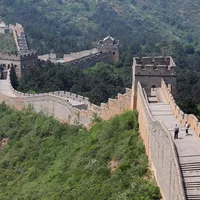292 马马虎虎 害死 人
careless|caused death|
292 Ich habe schlampig einen Mann getötet.
292 Careless kills people
292 à moitié à moitié tué des gens
292 Özensiz bir şekilde bir adam öldürdüm.
马马虎虎 害死 人
careless|caused death|
Careless kills people
à moitié à moitié tué des gens
まあまあ人を殺す
宋朝 * 有个 画家 , 喜欢 画虎 。
||||tigre
Song Dynasty||painter||painting a tiger
In the Song Dynasty, there was a painter who liked to paint tigers.
Sous la dynastie Song, il y avait un peintre qui aimait peindre des tigres.
宋王朝には虎の絵が好きな画家がいました。
一次 他 刚画 完 一个 虎头 , 有人 来 请 他 画马 , 他 顺笔 一挥 , 在 虎头 后面 添 了 一个 马 身子 。
|||||tête de tigre|||||||d'un coup de pinceau|||tête de tigre||||||
||just finished drawing|||tiger head|||||draw a horse||with a smooth stroke|with a stroke||||added|past tense marker|||horse body
Once he had just finished drawing a tiger head, someone invited him to draw a horse. He waved a pen and added a horse body behind the tiger's head.
Une fois, il venait de dessiner une tête de tigre, et quelqu'un est venu lui demander de dessiner un cheval. Il a alors d'un coup de pinceau ajouté un corps de cheval derrière la tête de tigre.
虎の頭を描き終えたばかりのとき、誰かが馬を描くように頼むようになりました。
那 人 问 他 :“ 你 画 的 是 马 还是 虎 啊 ?
||||||||horse||tiger|
The man asked him, "Did you draw a horse or a tiger?
L'autre personne lui a demandé : « Ce que tu as dessiné, c'est un cheval ou un tigre ? »
” 他 说 :“ 马马虎虎 罢 。
||so-so|it
He said: 'Just so-so.'
Il a répondu : « C'est un peu des deux. »
彼は「まあまあ」と言った。
” 买画 的 人 不要 了 。
acheter des peintures||||
the person who bought the painting|||no longer|
The buyer of the painting no longer wanted it.
Les personnes qui achètent des tableaux ne les veulent plus.
「絵画を買う人はもうそれを欲しがらない。
他 只好 把 这 幅 画 挂 在 墙上 日夜 * 欣赏 , 他 的 大儿子 见 了 , 问 他 画 的 是 什么 , 他 说 那 是 虎 ; 二 儿子 问 他 , 他 又 说 是 马 。
|had no choice but to|||the painting||hang||on the wall|day and night|appreciate|||eldest son||||||||||||||||||||||
He had no choice but to hang this painting on the wall to admire it day and night. When his eldest son saw it, he asked him what the painting was, and he said it was a tiger; when his second son asked him, he again said it was a horse.
Il n'a eu d'autre choix que de pendre cette peinture au mur pour l'admirer jour et nuit. Son fils aîné l'a vu et lui a demandé ce que représentait le tableau, il a répondu que c'était un tigre ; son deuxième fils lui a demandé, et il a encore dit que c'était un cheval.
后来 , 大儿子 打猎 * 遇到 了 一匹 马 , 以为 是 虎 , 拉弓 把 马 射死 , 结果 赔 了 人家 一匹 马钱 。
|||||||||||||||||||mule
||hunting|encountered||a horse|||||pulled the bow|indicates the object||shot dead|as a result|compensated for||||horse
Later, the eldest son hunted* and encountered a horse, thinking that it was a tiger. He took the horse and shot it dead, resulting in a loss of money.
Plus tard, le fils aîné est parti chasser et a rencontré un cheval, pensant que c'était un tigre, il a tendu son arc et a tué le cheval, ce qui lui a coûté l'argent d'un cheval à son propriétaire.
二 儿子 在 野外 * 遇到 了 一只 虎 , 以为 是 马 , 正 准备 去 骑 , 结果 被 虎 咬 死 了 。
|||sauvage|||||||||||||||||
|||the wilderness||||tiger|||||was preparing||||||bitten||
The two sons met a tiger in the field and thought it was a horse. They were preparing to ride and they were killed by the tiger.
Le fils a rencontré un tigre dans la nature, pensant que c'était un cheval, et s'apprêtait à le monter, mais a finalement été tué par le tigre.
画家 在 悲痛 中烧 了 这 幅 画 , 还 经常 用 自己 的 亲身 * 经历 去 劝告 * 人们 做 事情 千万 不能 马马虎虎 。
|||中烧|||||||||||||||||||
||grief|while grieving|||painting|||often||||firsthand|experience||advice|||things|must not||carelessly
The painter burned this painting in grief, and often used his own personal experiences to advise people to never be careless when doing things.
Le peintre a brûlé cette toile dans la douleur, et conseille souvent aux gens de ne jamais faire les choses à la légère en utilisant ses propres expériences.

